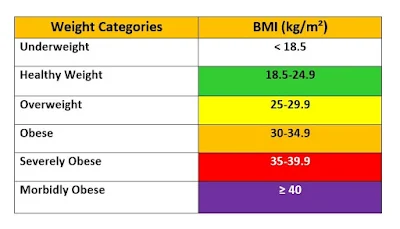Introduction
BMI or Body Mass Index can be an indicator of your fitness. It determine if one is underweight, healthy weight, overweight. BMI is measures with your height and weight and its result varies depending upon gender, age and daily diet. An abnormal BMI results may leads to health issues such as hypertension (high blood pressure), breathing problems, heart diseases etc.
So, Do you know your BMI?
How to calculate BMI?
Nurses Class is giving you the way to learn BMI calculation, Normal BMI ranges and much more to maintain your health and fitness.
Jump to - Calculate Your BMI
Definition of BMI
The Body Mass Index (BMI) is defined as the body mass divided by the square of the body height.
[ Body mass means a person's weight which measured in kilograms (kg) and height measured in meters square (m²) ]
Importance of BMI
• BMI is an important measurement to know the quantity of tissue mass presents in the individual. Based on the quantity of tissue mass the individuals are categorized as underweight, normal weight, overweight or obese.
• The BMI value of an individual is influenced by the both genetic and non-genetic factors and it helps to understand and prevent the risk factors for health problems.
• BMI value helps to maintain daily diet of the individuals based on their BMI result. Diet for the underweight and diet for the overweight individual's will be different.
• BMI provides a neumeric value which allowing the health care professionals to discuss weight problems with their clients.
BMI Chart
BMI Formula
How BMI is Calculated
For example : Mr.Bimal, an adult with height of 170 cm and weight of 65 kg. Calculate the BMI.
• First step is to convert the height into meters.
As there are 100 cm in a meter, so we have to divide the height value by 100.
- That means 170 cm = ( 170 ÷ 100 ) m
= 1.7 m
- According to BMI formula,
BMI = Weight (in kg) ÷ Height² (in meter)
= 65 ÷ ( 1.7 × 1.7 )
= 65 ÷ 2.89
= 22.49
BMI Calculator
BMI Calculator 1
BMI Calculator 2
BMI Calculator 3
Factors affecting BMI
Lifestyle Factor
• Dietary habits - A large amount consumption of high sugar and fat increases the weight. The total energy intake rises which leads to overweight.
• Physical Activity - Lack of physical activity and sedentary lifestyle leads to obesity. Daily physical activity habits can reduce weight and increase blood circulation.
• Sleeping Pattern - Disturbed sleeping pattern such as insomnia or lack of sleeping can cause the hormonal imbalance. Due to hormonal imbalance increase appetite for high carbohydrate and calorie foods.
Economical Factors
High status socioeconomic groups are able to buy costly foods which are contain high calorie. So, these groups may have more chance for overweight comparing to poor socioeconomic groups.
Psychological Factors
Some people eat more due to mood disorder such as anger, fear, worry and sadness which increase weight.
Studies have shown that 25 percent of obese people are experienced mood disorder like depression comparing to those who are not obese.
Genetic Factors
Studies identifed that few specific genes are control the body weight. Due to gene defect the synthesis of leptin may disturb which regulate the body weight.
A congenital absense of leptin produces continual hunger and marked obesity in childrens.
Conclusion
A neumerical value of BMI is essential for the every human life. During the health assesment the medical professionals check it for the health education and to maintain client's health by regulating diet, sleeping pattern, lifestyle etc.
NursesClass.com recommended you to check BMI in a weekly basis to take care of your health.







